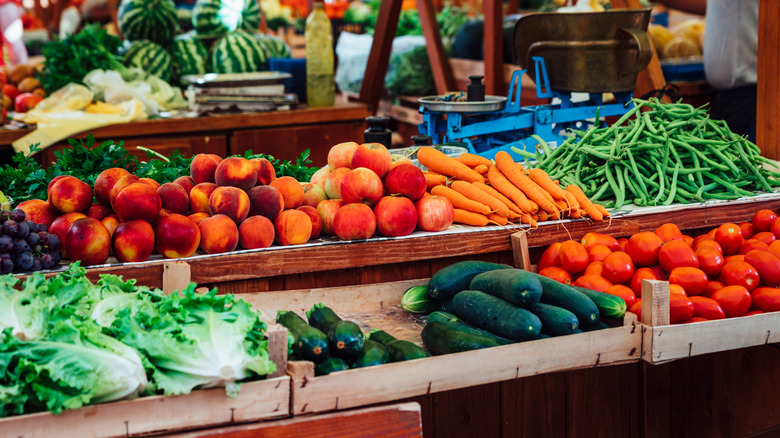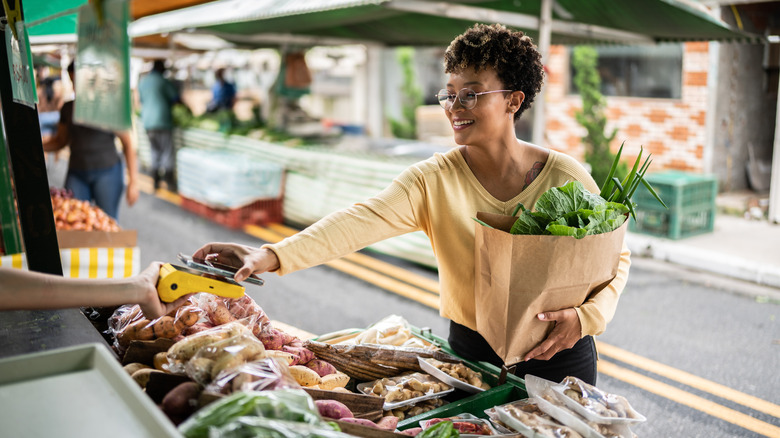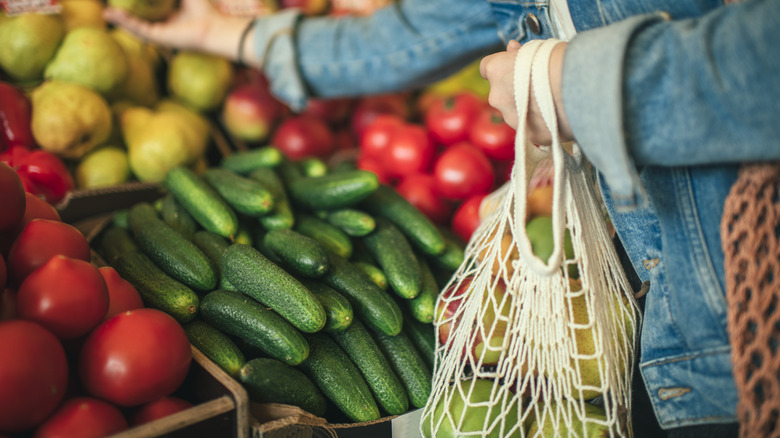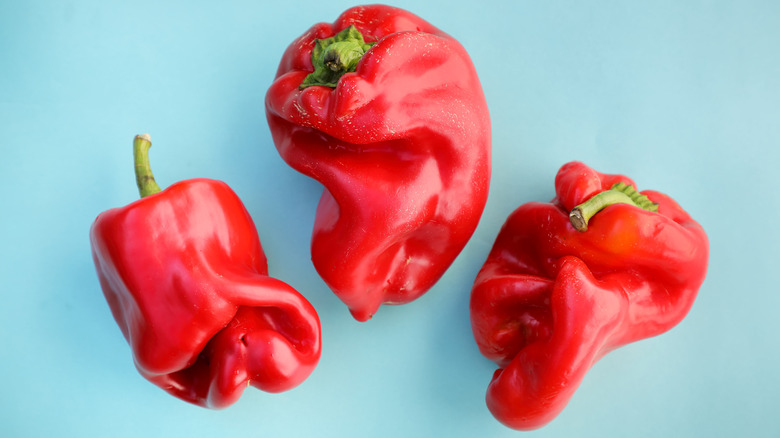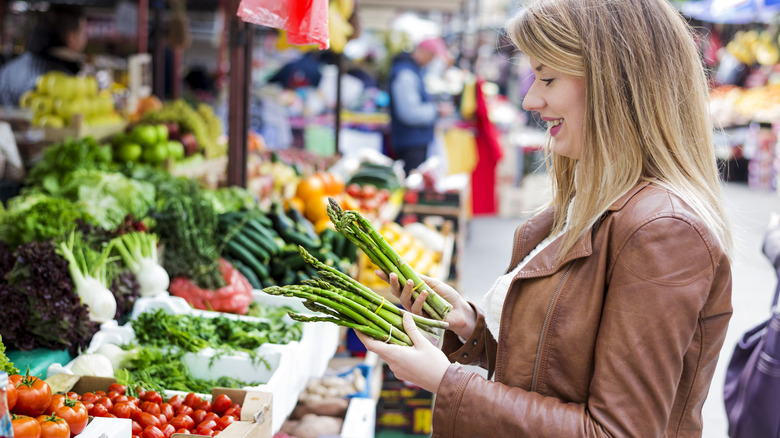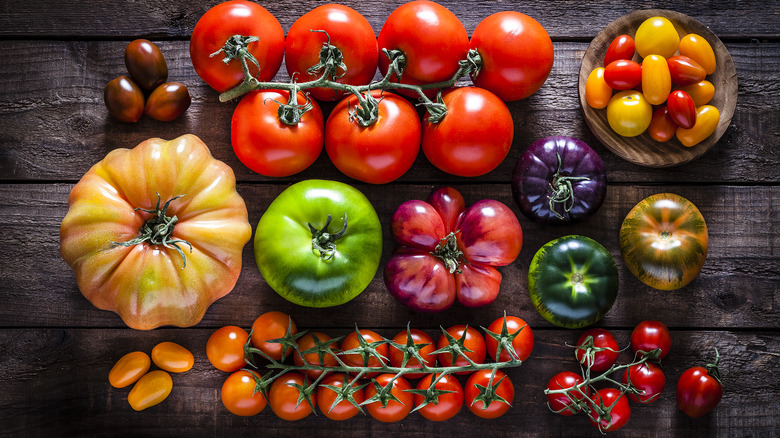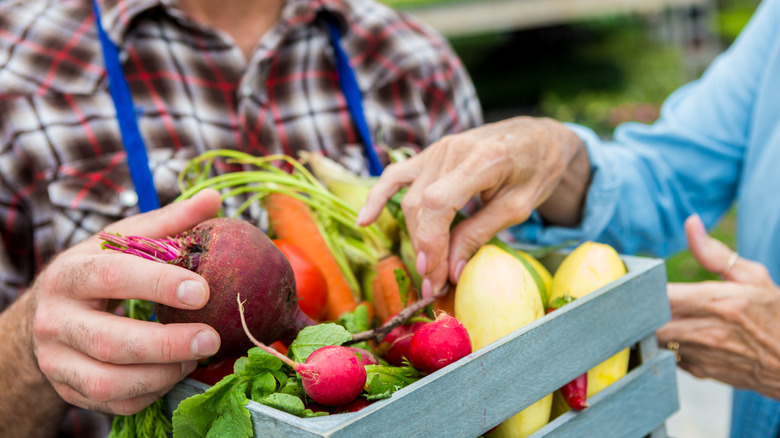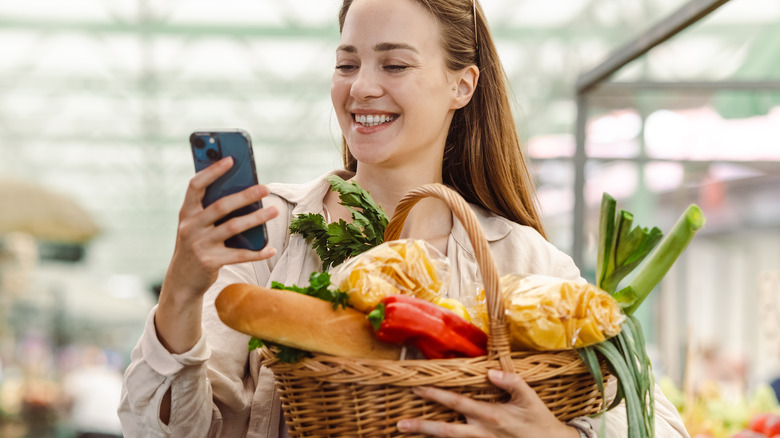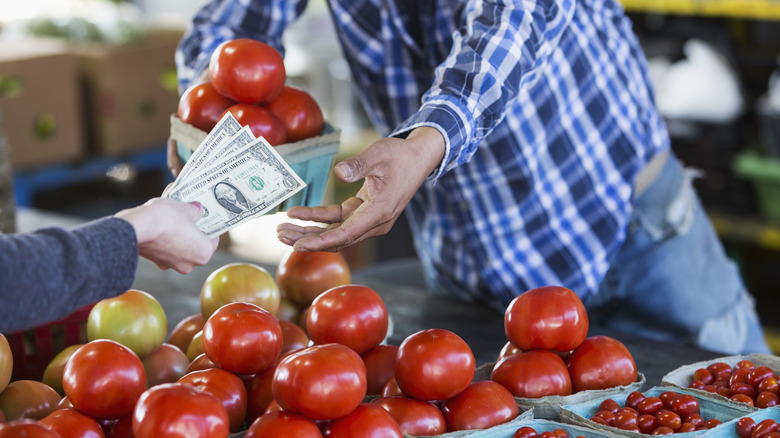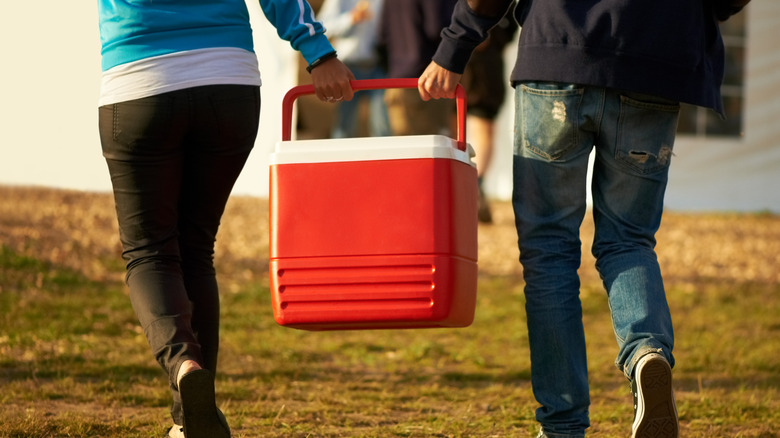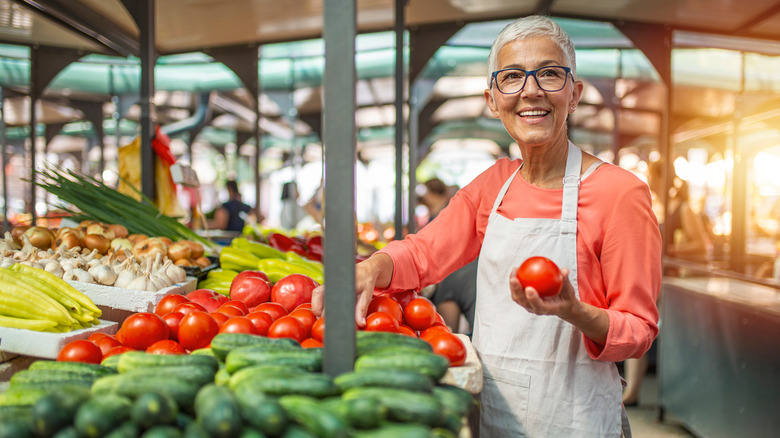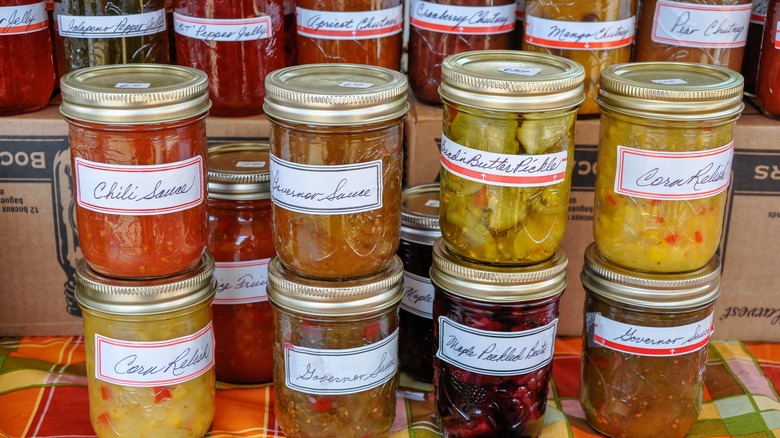11 Tips For Navigating Farmers Markets All Summer Long
There are so many things to love about summer! Water parks. Road trips. Family get-togethers. Grilling with a cocktail in hand. And of course, farmers markets!
Whether you're hitting up your neighborhood farmers market for fresh, seasonal vegetables, luscious herbs, or fruit that's just been picked, there's no better place that you can fill your kitchen from. First off: The food tastes better. Fruits and vegetables at a farmers market are almost always picked at the height of ripeness, sometimes just hours before being for sale. And this ensures maximum flavor and freshness.
Farmers market produce is also more nutritious — fresh and locally grown farmers market fare spends more time on the plant before being harvested, absorbing vitamins and nutrients that can be passed to you. And that means less time in storage or in transit, where those nutrients might otherwise deplete.
In fact, with so much to love about farmers markets, it's worth noting their popularity can lead to long lines, congestion, and fierce competition for in-demand product. Fortunately, with a little planning and advanced preparation, you won't have to suffer through those obstacles. You can shop your local farmers market confidently, beating the crowds, and getting the highest quality, best-tasting produce around. Here's a bunch of tips for navigating farmers markets throughout the summer!
Always arrive early to beat the crowds
Whether you live in a bustling metropolis or a smaller rural setting, if you want the best your local farmers market has to offer, you need to be there as soon as it opens to the public. We get it! Nobody wants to get up early on a lazy Saturday or Sunday, but the best quality produce at the farmers market waits for no one. So set your alarm, pour a big cuppa coffee, and aim to be parking as soon as the market is scheduled to open.
The benefits of your early arrival will be evident from the start. The market should feel incredibly peaceful and calm since most people won't be there. As you saunter your way through, you may stumble upon market booths offering freshly prepared breakfast specials. Perhaps you'll find an early-bird discount. By arriving early, you'll also get to handpick the best offerings at each vendor and nab any rare or in-demand items that might otherwise sell out quickly.
Another perk to arriving early: Choice parking, which can be very close to the market. This is helpful, especially if you plan on lugging lots of potentially heavy items — corn and melons, for instance — back to your car at the end of your excursion.
Bring your own bags and containers
Tossing a couple shopping bags into your trunk before heading to the farmers market is a basic necessity. In fact, a growing number of states and municipalities have banned single use plastics, so it may not be possible for vendors to give you a bag. But more than that, farmers markets are a hub of sustainability and mindful consumption — so bringing your own bags and containers makes sense. It's practical and convenient, helps reduce waste, and supports the local economy. Since many vendors at a farmers market are operating on very small profit margins, bringing a clean bag — so farmers don't have to invest in providing one — can dramatically help to increase their profits.
When possible, bring a variety of bagging options since you never know exactly what or how much of something you might buy. Start with a large canvas tote and then throw more traditional mesh or cloth bags inside so you have more than enough to carry items. It may also be good to pack one or more reusable plastic containers or jars for any fragile berries or spices.
Ask about seconds or imperfect produce
Many grocery stores throw away an incredible amount of fresh food as waste because people don't want to buy "ugly" produce. But a growing number of us have also begun to recognize that "ugly" is beautiful, even when it comes to peppers and tomatoes and berries and all other types of vegetables and produce. In fact, there are proven reasons why you may want to ask vendors at your farmers market if they have "seconds" or imperfect "misfit" produce for sale.
Consider this: Buying imperfect produce can save money. Because there's less interest in these "ugly" fruits and vegetables, you can generally get them at a cheaper cost. Imperfect produce is also good for the environment — because it helps to reduce food waste. It can also add some fun or quirkiness to your meals, since the vibrant colors or unusual aesthetics of your imperfect produce might be an ideal conversation starter.
If those weren't reasons enough to encourage buying imperfect produce at the farmers market, it's also worth noting that "ugly" fruits and vegetables sometimes taste better! It's true. Imperfect produce can surprise with intensified flavors — blemishes or irregularities often concentrate the sugars or flavor compounds in fruits and vegetables, resulting in a more robust and enjoyable flavor experience.
Plan your shopping list on the go
Shopping at a farmers market should feel like a special experience. It's more than just running to the grocery store for a jug of milk or a dozen eggs. So it would be a shame to go into the market with a set shopping list and only look for things you considered buying in advance. Yes, of course, you can make a list of essentials you need. But if you really want to navigate the farmers market like a pro, you also need to keep an open mind and let yourself be inspired by the things you find that you aren't necessarily looking for.
For example, you may spot some beautiful purple tomatoes and decide they could be the star a delicious heirloom tomato chutney or a tomato and mozzarella tart. Or perhaps a local farmer has just brought in a big batch of mouthwatering fresh peaches from her orchard. So now, with an open mind willing to be inspired by the food you see, you may decide to buy them and throw them on the grill to go with your pork chops — instead of the pineapple you'd previously been planning to grill.
As you walk around the market, prioritize the seasonal produce that's at its peak of freshness. How can you use those foods and how can you adapt recipes or menus to include them? Get inspired and be a little spontaneous!
Explore lesser-known produce varieties
Following the same ideology and being open to inspiration from the fresh fruits and vegetables at the farmers market, this is also worth noting: Take chances with produce. Sure, you may love giant beefsteak tomatoes — but if the selection of tomatoes from your favorite local vendor has already been picked over, or you don't see the tomatoes you are looking for, try something new from the same vegetable or fruit family. Consider Romas, yellow pear tomatoes, or tiny red cherry tomatoes. Opt for something even more unusual like a Green Zebra or Chocolate Stripe tomato. Try a new type of tomato each week — or buy a bunch of varieties and invite a few friends over to taste them all and see which you like best.
You can do the same thing with melons and types of lettuce — there are dozens of varieties you might find — and sometimes farmers specialize in unusual or unique produce. Try as many options as you can, especially if you haven't seen them before. Don't be afraid to ask a vendor questions, they're usually happy to engage, particularly when you arrive early. The point is: Make the most of what the farmers market has to offer; get educated on some items that are completely new to you. Be open!
Don't be afraid to negotiate
One of the most fulfilling aspects about a farmers market is that there is no middle-man. In most cases, you are buying fruits or vegetables directly from the person who grew them. We can see our purchase is going directly to support that individual's livelihood — and this is important and meaningful. It also gives us added flexibility — perhaps the farmer is selling apples by the bushel but you only want a couple because you are going out of town and don't want to see them spoil. Make an offer for two apples instead of the full lot and see if you can cut a deal. Maybe you love a certain type of fresh berry and have trouble finding it, so you want to buy in bulk and freeze the extra for later. Now's the perfect time to break out your negotiating skills and see if you can broker a bulk order.
In the same way, maybe the market is near closing and the farmer has a ton of produce left. This is the perfect time to make a deal. Negotiating isn't just good for your bank account, it also helps the farmer maximize their profits while reducing losses.
Follow the market on social media
If there's a farmers market you want to support, it's a good idea to follow it on social and "like" the pics. Increased social media engagement can also help boost the visibility and reach of a farmers market. By liking, sharing, and commenting on posts these markets create, you contribute to increasing their online presence, helping attract new customers, and fostering a thriving local food community.
On a more personal level, liking and following farmers markets is also good for you as a customer. It can keep you updated on special events and inform you about pop-up markets. Many farmers markets also use social media to share exclusive deals and promotions. By following them, you gain access to these offers, allowing you to make the most of your shopping experience.
Finally, many farmers market social media channels are filled with posts from local food lovers who share recipes and tips. So following may also help you find a new friend or provide inspiration for a favorite new dish.
Bring cash in small bills
In our digital age, carrying cash might seem old fashioned. But farmers markets are a bit different. To navigate a farmers market like a pro, it's always a good idea to stop at an ATM in advance and have cash on hand. Think of it like visiting a flea market or any other challenging rural location where wi-fi isn't always so great. Of course, even at the most old-school farmers market you may run across a vendor who is happy to swipe your credit card or phone and text you a receipt. But every vendor won't be like that.
You may have to deal with an old-fashioned traditionalist who prefers customers make all purchases in cash. Or you may end up in a long line where the credit card machine is struggling to keep up. In either case, having cash in hand — preferably in small bills so you can pay exactly what you owe without needing change — can help you make purchases, and your vendor will appreciate it.
Pack a cooler with ice
The blessing and curse of farmers markets is that they start early. More often than not, the farmers market is going to be one stop on a busy morning full of sun-packed errands. You may plan on going out for a bike ride after you shop, or maybe you're meeting friends for brunch. Whatever the case, if your farmers market visit was successful and you're fully loaded with beautiful fresh fruit and veggies, you can't leave that stuff in a hot car! Because when you come back to that produce, it's going to be sweating, wilted, and way less fresh than it was just a few hours before.
The solution? Whenever you are planning a trip to the farmers market, grab a portable cooler and ice (or ice packs) and throw it in the trunk or back seat. That way, when you're done shopping, you have somewhere cool you can keep everything you bought to preserve its freshness. Especially if you purchased fresh fish or meat — you'll definitely want to keep those items in a cooler with ice. Your fruit, veggies, and meat — not to mention your taste buds — will thank you!
Talk to the growers and sellers and show appreciation
It takes a special kind of person to commit their life to growing and raising food for other people to eat and enjoy. It also takes a gracious and nurturing spirit who can put all their time and energy into helping a plant grow and produce the best crop possible. That's why farmers are often considered some of the finest people around. And when you visit a farmers market, you get to interact with these hard-working men and women and literally enjoy the fruits of their labor.
That's also why one of the most important steps to navigating any farmers market is being sure to really take a moment to pause and thank these people and show some gratitude for their efforts. Tell them how beautiful their crop looks, and how excited you are to be taking home their apples, giant squash, or peppers. Ask a question about where the item was grown or when it was picked. Chat about the best way to prepare something, or get their advice on how they would cook or eat whatever you are buying.
Soak up the knowledge farmers provide, and learn a bit more about the food you'll be eating. It will make the experience at the farmers market richer and more meaningful — for both you and the farmer you're buying from.
Check out what else is for sale
Finally, and perhaps most importantly, if you want to navigate the farmers market like a pro and make the most of each and every visit, always make sure you check out what else is for sale besides the produce.
Because farmers often have a bounty of fresh crops to use up in order to avoid spoiling, farmers markets are an incredible spot to find any number of homemade wonders. You may find succulent homemade jams and jellies, honey made from local fields and crops, savory pickles of all varieties, canned sauces and salsas, and so much more. Many farmers markets also have vendors with amazing baked goods including breads, cookies, cakes, and pies. And if you're really lucky, you may end up shopping at a farmers market with other local artisans: cheese makers, people selling fresh eggs, meat growers with fresh sausages or cured meats. Or perhaps you'll find knitters, painters, woodworkers or other craftspeople, also selling their homemade arts.
The beauty of the farmers market is that you just never know what you may find. So the biggest secret to navigating any farmers market successfully all summer long is to go regularly, start each visit with an open mind, and always make the most of your experience, trying new things, and finding ways to stay inspired and excited in the kitchen. Happy shopping!

